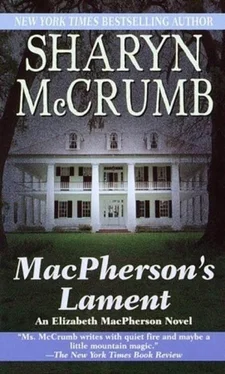Sharyn McCrumb - MacPherson's Lament
Здесь есть возможность читать онлайн «Sharyn McCrumb - MacPherson's Lament» весь текст электронной книги совершенно бесплатно (целиком полную версию без сокращений). В некоторых случаях можно слушать аудио, скачать через торрент в формате fb2 и присутствует краткое содержание. Жанр: Детектив, на английском языке. Описание произведения, (предисловие) а так же отзывы посетителей доступны на портале библиотеки ЛибКат.
- Название:MacPherson's Lament
- Автор:
- Жанр:
- Год:неизвестен
- ISBN:нет данных
- Рейтинг книги:3 / 5. Голосов: 1
-
Избранное:Добавить в избранное
- Отзывы:
-
Ваша оценка:
- 60
- 1
- 2
- 3
- 4
- 5
MacPherson's Lament: краткое содержание, описание и аннотация
Предлагаем к чтению аннотацию, описание, краткое содержание или предисловие (зависит от того, что написал сам автор книги «MacPherson's Lament»). Если вы не нашли необходимую информацию о книге — напишите в комментариях, мы постараемся отыскать её.
MacPherson's Lament — читать онлайн бесплатно полную книгу (весь текст) целиком
Ниже представлен текст книги, разбитый по страницам. Система сохранения места последней прочитанной страницы, позволяет с удобством читать онлайн бесплатно книгу «MacPherson's Lament», без необходимости каждый раз заново искать на чём Вы остановились. Поставьте закладку, и сможете в любой момент перейти на страницу, на которой закончили чтение.
Интервал:
Закладка:
Bill unlocked the door and escorted the visitors into an oak-paneled hallway that extended the length of the house. To their right was a flight of stairs with an elaborately carved banister and newel post. The carpet was threadbare and the dusty light fixture did not sufficiently illuminate the hall, but traces of the home’s former splendor were still evident in the workmanship and the materials used. “There are three stories to the house,” Bill told them, stealing a glance at an index card he’d concealed in the pocket of his blazer. “And a full basement. The third floor has been sealed off for many years, as the number of residents diminished. All in all, though, there are ten bedrooms in the house, and”-another peek at his notes-“eight baths. One on the first floor; the rest are upstairs. The main parlor is to your left. The ornamental plasterwork is original.”
John Huff inspected every room in the house with meticulous care while the two attorneys trailed after him, making what they hoped were intelligent remarks. He examined all three floors, paying particular attention to the shelves of books in the first-floor library. Bill had never heard of most of the titles, but the books were certainly old, many of them were leather bound, and they were probably valuable.
“I would expect these to be included in the sale of the house,” said Huff.
“I’ll mention that to my clients,” Bill stammered.
“Is there an attic?”
“I think so,” said Bill. “Would you like to see it?” He was trying to remember how to get there.
“Perhaps later,” said Huff. “When we looked in the basement, I noticed that there were some trunks and boxes. What about them?”
“I’ll ask. Do you want that stack of National Geographics down there, too?”
“Everything. Also, do you have any information as to what role this house played in the Civil War?”
“Nothing much,” said Bill, who didn’t have to consult his notes for that. He considered it the weakest link in his sales pitch. “I mean, Robert E. Lee didn’t sleep here or anything. Of course, Danville was the last capital of the Confederacy, for about ten days in 1865 when nobody cared anymore. You know that song, ‘The Night They Drove Old Dixie Down’? When Joan Baez sings that line about being on the Danville train, that’s what she’s talking about.”
“Country music seems to have been a vast educational resource for you,” said Huff. “I believe we were discussing this house during that time.”
“Oh, right. Well, as I said, it was here then, but it wasn’t used for government business. I think that the Phillips family played host to some minor Confederate officials. People named-” He peeked at his card. “Miss Dabney wrote this out for me in case you turned out to be a history buff. Umm… here it is. A Mr. Micajah Clark, a Mr. Semple, and the postmaster general, a Mr. Reagan. Wonder if he’s any relation?”
“I think not,” said Huff, looking singularly unamused. Bill got the impression, though, that there had been a flash of recognition in his cold eyes at the recital of that list of names.
They finished their tour in the antiquated kitchen, but John Huff did not seem dismayed by the lack of modern appliances or the faded linoleum and drab green walls. “It’s a big room,” Bill said lamely. “It has possibilities.”
“So does garbage,” muttered Nathan Kimball to himself.
“I’ve seen enough,” John Huff announced. “I’ll be staying in town a few days. Perhaps you could recommend a hotel?”
“Sure,” said Bill. “There’s the Stratford Inn, the Best Western on Highway 58-”
“Never mind. We’ll look in the phone book. As I was saying, Kimball and I will be staying a few days. If at the end of that time we find that everything checks out-the appraisal, the survey, and so on-then I’ll make your clients an offer for the house.”
“Did I mention their terms?” asked Bill, waiting for the deal to come crashing down as he spoke. “I’m afraid they’re rather eccentric about business matters. They don’t seem to trust banks. It’s probably the result of having lived through the Depression, don’t you think? Anyhow, they don’t want to be bothered with financing.”
“I understand. If the details all check out, I’ll be prepared to offer them a cashier’s check for the full amount. I will, of course, expect a discount for cash.”
“I’ll tell them,” Bill promised. “I expect you’ll be meeting them at closing, so if there’s anything else you’d like to know about the house, perhaps you can ask them then.”
John Huff nodded. “Well, there is one thing. Do you happen to know if there are any secret passages in the house?”

One day he is there and smiling.
The next he is gone as if he had taken fernseed
And walked invisible so through the Union lines.
You will not find that smile in a Northern prison
Though you seek from now till Doomsday.
– STEPHEN VINCENT BENÉT,
John Brown’s Body, Book 8
WASHINGTON, GEORGIA- MAY 5, 1865
GABRIEL HAWKS WAS now a lieutenant in the army, but the honor of the field promotion paled somewhat when he considered how little competition remained for a position in the ranks of Confederate officers. After Lee surrendered the Army of Northern Virginia at Appomattox Courthouse on Palm Sunday, President Davis and the Confederate government had left Danville by train and proceeded to Greensboro, North Carolina, to confer with General Joseph E. Johnston and General P. G. Beauregard about the fate of the Cause.
Most of the lower ranks felt no need to wait for further advice about the outcome of the war. They were deserting from the train at every station, leaving their posts and their comrades, and slipping away to lose themselves in the tide of fugitives heading for home. Gabriel couldn’t say that he blamed them. How could anyone doubt that the war was lost in the face of the evidence of his own eyes? One of the soldiers who had been in the cabinet car was telling it all over about how he saw the secretary of the navy and the adjutant general passing a tin cup of coffee back and forth, for want of utensils, while the secretary of state himself was dipping his dinner out of a haversack of hard-boiled eggs. The soldier said they bore it all cheerfully, even joking about these sorry circumstances-and perhaps that was the worst sign of all. Surely the end was near.
Gabriel Hawks might have run, too. He was thinking about it as the train headed westward into Piedmont, North Carolina. He could follow the New River north and be back in Giles County before June. But then the navy’s paymaster James Semple had made him a lieutenant, and he felt he ought to set an example for the rest. Bridgeford laughed at him, of course, but then they made him a lieutenant, too, so there they were, in ragged, ill-fitting uniforms scrounged from somewhere by Mr. Semple. They hoped they wore deserters’ coats, not the leavings of dead men. Still, they were officers.
“The rise in pay delights me,” Bridgeford drawled. “Now it will only take us three months to save up our wages for a pound of butter.”
“That is, if they pay us at all.”
“True, Hawks. And well noted. But, hell, we may as well stick it out a while,” Bridgeford said, laughing. “Maybe Johnston can whip Sherman in Carolina. Maybe the damned Texans will march across the Mississippi and win the war for us yet. Then we’ll be fixed for life.”
“You think they will?” Hawks had asked him, feeling a shiver of hope.
“No,” said Bridgeford. “But look out there.” He pointed to the rolling vista of cornstalks, brown and broken behind crumbling fences. “It’s the same everywhere, Hawks.”
Читать дальшеИнтервал:
Закладка:
Похожие книги на «MacPherson's Lament»
Представляем Вашему вниманию похожие книги на «MacPherson's Lament» списком для выбора. Мы отобрали схожую по названию и смыслу литературу в надежде предоставить читателям больше вариантов отыскать новые, интересные, ещё непрочитанные произведения.
Обсуждение, отзывы о книге «MacPherson's Lament» и просто собственные мнения читателей. Оставьте ваши комментарии, напишите, что Вы думаете о произведении, его смысле или главных героях. Укажите что конкретно понравилось, а что нет, и почему Вы так считаете.












